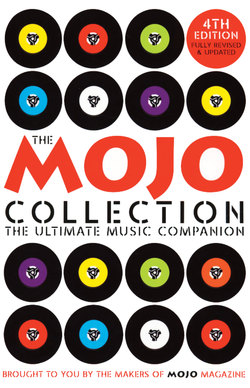Читать книгу The Mojo Collection - Various Mojo Magazine - Страница 130
На сайте Литреса книга снята с продажи.
Os Mutantes Os Mutantes Eccentric Brazilian trio invent South American psych.
ОглавлениеRecord label: Polydor
Produced: Manuel Barenbeim
Recorded: Philips Studios, Brazil; 1967–1968
Released: June 1968
Chart peaks: None (UK) None (US)
Personnel: Rita Lee (v, pc, flute); Arnaldo Baptista (b, v); Sergio Dias Baptista (g); Rogério Duprat (ar)
Track listing: Panis Et Circencis; A Minha Menina; O Relogio; Adeus Maria Fulo; Baby; Senhor F; Bat Macumba; Le Premier Bonheur Du Jour; Trem Fantasma; Tempo No Tempo; Ave Genghis Khan
Running time: 36.01
Current CD: Polydor 8294982
Further listening: Mutantes (1969); A Divina Comedia Ou Ando Meio Desligado (1970); Technicolor (1970), a recently released collection of highlights re-recorded in English, never issued at the time; Jardim Eléctrico (1971); Arnaldo Baptista’s solo album tribute to his lost love, Rita (1974); Everything Is Possible: The Best Of Os Mutantes (1999)
Further reading: www.luakabop.com/os_mutantes/cmp/main.html
Download: iTunes; HMV Digital
The explosion of invention in mid-’60s pop was startling enough to anyone listening on the Anglo-American axis. Imagine how it must have sounded in a place where music followed rigid traditional guidelines and ‘pop’ was the province of fife and drum bands. When a particularly insane Brazilian rock trio called Os Mutantes (The Mutants) unveiled a mischievous, wayward hybrid of Pepper Beatles, Piper Floyd and Disraeli Cream having a bossa-nova jam at a popular Brazilian music festival in September 1967, no one was too surprised when the crowd started booing and throwing things, or when the use of electric guitars was subsequently banned at the festival.
Originally from São Paolo, Os Mutantes became the adopted rock band of the Tropicalia movement, a group of artists from Bahia state who brought together music, pop art and concrete poetry to good-humouredly undermine conservative tradition and irritate the ruling military regime, taking pleasure in sending up Brazilian sacred cows or appearing on TV in plastic trousers for a dada freak-out. Eccentric singer and percussionist Rita Lee, her loopy husband Arnaldo Baptista and his brother Sergio, all still in their teens, were guaranteed to delight or offend as required. A third Baptista brother remained off-stage building guitars for Sergio and creating fearsome musical devices out of electric sewing machines. There were also contributions from Tropicalia’s pet orchestrator, the gifted Rogério Duprat.
This, the team’s debut album, was a lovely antic party in Portuguese, featuring wild versions of their contemporaries’ songs. Tropicalia colleagues Caetano Veloso, Gilberto Gil and Jorge Ben were all present, as was a cover of The Mamas and Papas’ Once Was A Time I Thought and an alkaline guitar sound which seared its way across Veloso’s languid blues for the modern era, Baby.
Inspired by Sgt. Pepper to experiment in the studio, their more peculiar inventions included using aerosol sprays in place of cymbals and serving a meal in the vocal booth and recording the prandial proceedings. One might assume that they were familiar with psychedelic drugs. In fact, the Baptista brothers were naturally bizarre enough not to need any chemical assistance, and didn’t sample acid until they visited London in 1970.
Their crazy dream went sour in 1972 when Rita and Arnaldo split after a studio quarrel and she began a successful solo career. Relations between the two factions have been intensely awkward ever since. The brothers’ subsequent albums went into the realms of prog rock and Arnaldo descended into something akin to Brazil’s answer to Syd Barrett. But at their peak they were producing some of the ’60s’ most vital music – in any language.
